Tornado之笔记集合
目录
一、基本使用
1、最简使用

import tornado.ioloop import tornado.web class MainHandler(tornado.web.RequestHandler): def get(self): self.write("Hello, world") application = tornado.web.Application([ (r"/index", MainHandler), ]) if __name__ == "__main__": application.listen(8888) tornado.ioloop.IOLoop.instance().start()

2、settings
settings = { 'template_path': 'template', # html文件夹 'static_path': 'static', # 静态文件夹 'static_url_prefix': '/static/', # html里的静态文件夹路径前缀 'ui_methods': mt, 'ui_modules': md, } application = tornado.web.Application([ (r"/index", MainHandler), ], **settings) # 在这使用**settings
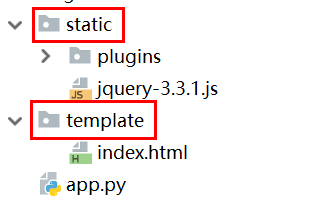
(1)html里静态文件使用方法
建议用这种 <link href="{{static_url("css/common.css")}}" rel="stylesheet" /> <script src="{{static_url("jquery-3.3.1.js")}}"></script> 或 <link href="/static/css/common.css" rel="stylesheet" /> <script src="/static/jquery-3.3.1.js"></script>
静态文件缓存的实现(这段不知道是什么,先记录下来)

def get_content_version(cls, abspath): """Returns a version string for the resource at the given path. This class method may be overridden by subclasses. The default implementation is a hash of the file's contents. .. versionadded:: 3.1 """ data = cls.get_content(abspath) hasher = hashlib.md5() if isinstance(data, bytes): hasher.update(data) else: for chunk in data: hasher.update(chunk) return hasher.hexdigest()
路由系统
1、基本使用
路由系统其实就是 url 和 类 的对应关系,这里不同于其他框架,其他很多框架均是 url 对应 函数,Tornado中每个url对应的是一个类
class MainHandler(tornado.web.RequestHandler): def get(self): self.write("Hello, world") application = tornado.web.Application([ (r"/index", MainHandler), (r"/story/([0-9]+)", StoryHandler), ])

import tornado.ioloop import tornado.web class MainHandler(tornado.web.RequestHandler): def get(self): self.write("Hello, world") class StoryHandler(tornado.web.RequestHandler): def get(self, story_id): self.write("You requested the story " + story_id) class BuyHandler(tornado.web.RequestHandler): def get(self): self.write("buy.wupeiqi.com/index") application = tornado.web.Application([ (r"/index", MainHandler), (r"/story/([0-9]+)", StoryHandler), ]) application.add_handlers('buy.wupeiqi.com$', [ (r'/index',BuyHandler), ]) if __name__ == "__main__": application.listen(80) tornado.ioloop.IOLoop.instance().start()
2、其他
reverse_url

#!/usr/bin/env python # -*- coding:utf-8 -*- import tornado.ioloop import tornado.web from tornado.web import RequestHandler class MainHandler(RequestHandler): def get(self): url1 = self.application.reverse_url("n1") print(url1) url2 = self.application.reverse_url("n2",666) print(url2) self.write("Hello, world") class HomeHandler(RequestHandler): def get(self,*args,**kwargs): print(args) print(kwargs) self.write("welcome home") application = tornado.web.Application([ (r"/index", MainHandler,{},"n1"), (r"/home/(?P<pk>\d+)", HomeHandler,{},"n2"), ]) if __name__ == "__main__": application.listen(8888) tornado.ioloop.IOLoop.instance().start() ''' /index /home/666 '''
视图函数
模版语言
1、基本使用

#!/usr/bin/env python # -*- coding:utf-8 -*- import tornado.ioloop import tornado.web class MainHandler(tornado.web.RequestHandler): def get(self): self.render("index.html", list_info = [11,22,33]) application = tornado.web.Application([ (r"/index", MainHandler), ]) if __name__ == "__main__": application.listen(8888) tornado.ioloop.IOLoop.instance().start()

<!DOCTYPE html>
<html>
<head>
<meta http-equiv="Content-Type" content="text/html; charset=UTF-8"/>
</head>
<body>
<div>
<ul>
{% for item in list_info %}
<li>{{item}}</li>
{% end %}
</ul>
</div>
</body>
</html>

在模板中默认提供了一些函数、字段、类以供模板使用: escape: tornado.escape.xhtml_escape 的別名 xhtml_escape: tornado.escape.xhtml_escape 的別名 url_escape: tornado.escape.url_escape 的別名 json_encode: tornado.escape.json_encode 的別名 squeeze: tornado.escape.squeeze 的別名 linkify: tornado.escape.linkify 的別名 datetime: Python 的 datetime 模组 handler: 当前的 RequestHandler 对象 request: handler.request 的別名 current_user: handler.current_user 的別名 locale: handler.locale 的別名 _: handler.locale.translate 的別名 static_url: for handler.static_url 的別名 xsrf_form_html: handler.xsrf_form_html 的別名
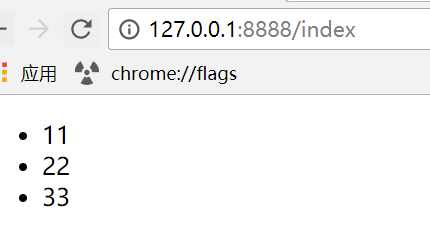
2、for、if使用
{% for item in list_info %}
<li>{{item}}</li>
{% end %}
{% if item > 22 %}
<h1>{{item}}</h1>
{% else %}
<li>{{item}}</li>
{% end %}
3、母版、插件
(1)母版
用法与django基本一致 {% extends 'xxxxxxxx.html'%} {% block xxx %}{% end %}

<!DOCTYPE html>
<html>
<head>
<meta http-equiv="Content-Type" content="text/html; charset=UTF-8"/>
<title>老男孩</title>
{% block CSS %}{% end %}
</head>
<body>
<div class="pg-header">
</div>
{% block RenderBody %}{% end %}
{% block JavaScript %}{% end %}
</body>
</html>

{% extends 'layout.html'%}
{% block CSS %}
{% end %}
{% block RenderBody %}
<h1>Index</h1>
<ul>
{% for item in list_info %}
<li>{{item}}</li>
{% end %}
</ul>
{% end %}
{% block JavaScript %}
{% end %}

(2)插件
用法与django基本一致 {% include 'xxxxx.html' %}

<div>
<ul>
<li>1024</li>
<li>42区</li>
</ul>
</div>

<!DOCTYPE html>
<html>
<head>
<meta http-equiv="Content-Type" content="text/html; charset=UTF-8"/>
</head>
<body>
<div class="pg-header">
{% include 'header.html' %}
</div>
</body>
</html>
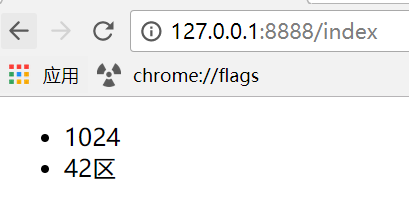
4、自定义UIMethod、UIModule
类似于django的simply_tag
(1)自定义uimethods.py与uimodules.py。注意:这里的uimethods和uimodules只是py的文件名

def tab(self): return 'UIMethod'

#!/usr/bin/env python # -*- coding:utf-8 -*- from tornado.web import UIModule from tornado import escape class custom(UIModule): def render(self, *args, **kwargs): return escape.xhtml_escape('<h1>模版语言</h1>')
(2)在主程序中注册settings

#!/usr/bin/env python # -*- coding:utf-8 -*- import tornado.ioloop import tornado.web from tornado.escape import linkify import uimodules as md # 导入自定义模块 import uimethods as mt # 导入自定义模块 class MainHandler(tornado.web.RequestHandler): def get(self): self.render('index.html') settings = { 'template_path': 'template', # html文件夹 'static_path': 'static', # 静态文件夹 'static_url_prefix': '/static/', 'ui_methods': mt, 'ui_modules': md, } application = tornado.web.Application([ (r"/index", MainHandler), ], **settings) if __name__ == "__main__": application.listen(8888) tornado.ioloop.IOLoop.instance().start()
(3)在html上使用

<!DOCTYPE html> <html> <head lang="en"> <meta charset="UTF-8"> <title></title> <link href="{{static_url("commons.css")}}" rel="stylesheet" /> </head> <body> <h1>hello</h1> {% module custom(123) %} {{ tab() }} </body>
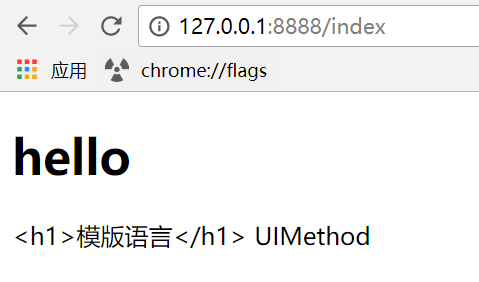
cookie
self.set_cookie("mycookie", "myvalue") self.get_cookie("xxx") self.set_secure_cookie("mycookie", "myvalue") self.get_secure_cookie("xxx") expires使用时间戳 import time expire_time = time.time() + 300 # 时间戳 self.set_cookie("mycookie","myvalue",expires=expire_time)
1、基本使用

import tornado.ioloop import tornado.web class MainHandler(tornado.web.RequestHandler): def get(self): self.set_cookie('test_cookie',"helloworld") self.write("Hello, world") application = tornado.web.Application([ (r"/index", MainHandler), ]) if __name__ == "__main__": application.listen(8888) tornado.ioloop.IOLoop.instance().start()

2、加密cookie(签名)
Cookie 很容易被恶意的客户端伪造。加入你想在 cookie 中保存当前登陆用户的 id 之类的信息,你需要对 cookie 作签名以防止伪造。Tornado 通过 set_secure_cookie 和 get_secure_cookie 方法直接支持了这种功能。 要使用这些方法,你需要在创建应用时提供一个密钥,名字为 cookie_secret。 你可以把它作为一个关键词参数传入应用的设置中。
签名cookie的本质:
写cookie过程: 将值进行base64加密 对除值以外的内容进行签名,哈希算法(无法逆向解析) 拼接 签名 + 加密值 读cookie过程: 读取 签名 + 加密值 对签名进行验证 base64解密,获取值内容

import tornado.ioloop import tornado.web class MainHandler(tornado.web.RequestHandler): def get(self): if not self.get_secure_cookie("mycookie"): self.set_secure_cookie("mycookie", "myvalue") self.write("Your cookie was not set yet!") else: self.write("Your cookie was set!") application = tornado.web.Application([ (r"/index", MainHandler), ], cookie_secret="61oETzKXQAGaYdkL5gEmGeJJFuYh7EQnp2XdTP1o/Vo=") if __name__ == "__main__": application.listen(8888) tornado.ioloop.IOLoop.instance().start()

def _create_signature_v1(secret, *parts): hash = hmac.new(utf8(secret), digestmod=hashlib.sha1) for part in parts: hash.update(utf8(part)) return utf8(hash.hexdigest()) # 加密 def _create_signature_v2(secret, s): hash = hmac.new(utf8(secret), digestmod=hashlib.sha256) hash.update(utf8(s)) return utf8(hash.hexdigest()) def create_signed_value(secret, name, value, version=None, clock=None, key_version=None): if version is None: version = DEFAULT_SIGNED_VALUE_VERSION if clock is None: clock = time.time timestamp = utf8(str(int(clock()))) value = base64.b64encode(utf8(value)) if version == 1: signature = _create_signature_v1(secret, name, value, timestamp) value = b"|".join([value, timestamp, signature]) return value elif version == 2: # The v2 format consists of a version number and a series of # length-prefixed fields "%d:%s", the last of which is a # signature, all separated by pipes. All numbers are in # decimal format with no leading zeros. The signature is an # HMAC-SHA256 of the whole string up to that point, including # the final pipe. # # The fields are: # - format version (i.e. 2; no length prefix) # - key version (integer, default is 0) # - timestamp (integer seconds since epoch) # - name (not encoded; assumed to be ~alphanumeric) # - value (base64-encoded) # - signature (hex-encoded; no length prefix) def format_field(s): return utf8("%d:" % len(s)) + utf8(s) to_sign = b"|".join([ b"2", format_field(str(key_version or 0)), format_field(timestamp), format_field(name), format_field(value), b'']) if isinstance(secret, dict): assert key_version is not None, 'Key version must be set when sign key dict is used' assert version >= 2, 'Version must be at least 2 for key version support' secret = secret[key_version] signature = _create_signature_v2(secret, to_sign) return to_sign + signature else: raise ValueError("Unsupported version %d" % version) # 解密 def _decode_signed_value_v1(secret, name, value, max_age_days, clock): parts = utf8(value).split(b"|") if len(parts) != 3: return None signature = _create_signature_v1(secret, name, parts[0], parts[1]) if not _time_independent_equals(parts[2], signature): gen_log.warning("Invalid cookie signature %r", value) return None timestamp = int(parts[1]) if timestamp < clock() - max_age_days * 86400: gen_log.warning("Expired cookie %r", value) return None if timestamp > clock() + 31 * 86400: # _cookie_signature does not hash a delimiter between the # parts of the cookie, so an attacker could transfer trailing # digits from the payload to the timestamp without altering the # signature. For backwards compatibility, sanity-check timestamp # here instead of modifying _cookie_signature. gen_log.warning("Cookie timestamp in future; possible tampering %r", value) return None if parts[1].startswith(b"0"): gen_log.warning("Tampered cookie %r", value) return None try: return base64.b64decode(parts[0]) except Exception: return None def _decode_fields_v2(value): def _consume_field(s): length, _, rest = s.partition(b':') n = int(length) field_value = rest[:n] # In python 3, indexing bytes returns small integers; we must # use a slice to get a byte string as in python 2. if rest[n:n + 1] != b'|': raise ValueError("malformed v2 signed value field") rest = rest[n + 1:] return field_value, rest rest = value[2:] # remove version number key_version, rest = _consume_field(rest) timestamp, rest = _consume_field(rest) name_field, rest = _consume_field(rest) value_field, passed_sig = _consume_field(rest) return int(key_version), timestamp, name_field, value_field, passed_sig def _decode_signed_value_v2(secret, name, value, max_age_days, clock): try: key_version, timestamp, name_field, value_field, passed_sig = _decode_fields_v2(value) except ValueError: return None signed_string = value[:-len(passed_sig)] if isinstance(secret, dict): try: secret = secret[key_version] except KeyError: return None expected_sig = _create_signature_v2(secret, signed_string) if not _time_independent_equals(passed_sig, expected_sig): return None if name_field != utf8(name): return None timestamp = int(timestamp) if timestamp < clock() - max_age_days * 86400: # The signature has expired. return None try: return base64.b64decode(value_field) except Exception: return None def get_signature_key_version(value): value = utf8(value) version = _get_version(value) if version < 2: return None try: key_version, _, _, _, _ = _decode_fields_v2(value) except ValueError: return None return key_version 内部算法
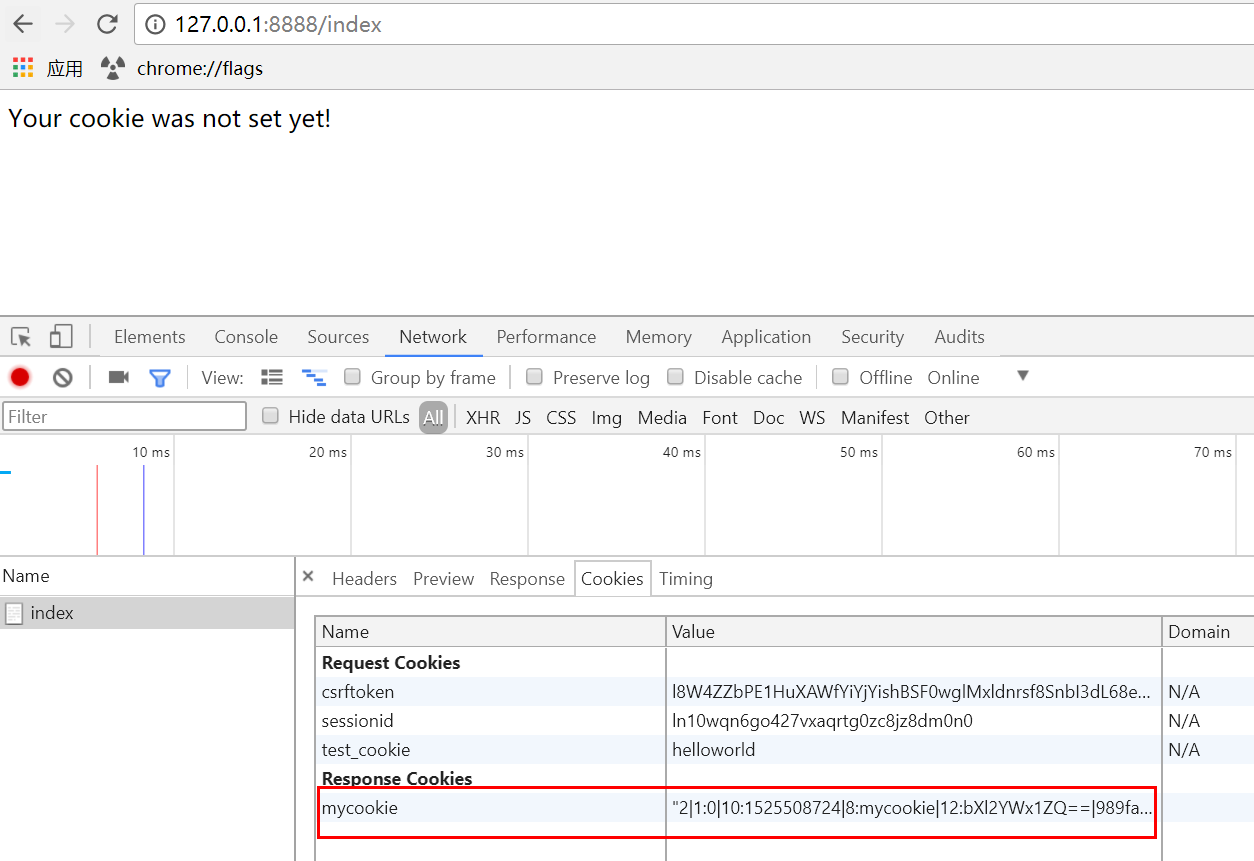
CSRF
Tornado中的跨站请求伪造和Django中的相似
(Ajax使用时,本质上就是去获取本地的cookie,携带cookie再来发送请求)

settings = { "xsrf_cookies": True, } application = tornado.web.Application([ (r"/", MainHandler), (r"/login", LoginHandler), ], **settings)

<form action="/new_message" method="post"> {{ xsrf_form_html() }} <input type="text" name="message"/> <input type="submit" value="Post"/> </form>

function getCookie(name) { var r = document.cookie.match("\\b" + name + "=([^;]*)\\b"); return r ? r[1] : undefined; } jQuery.postJSON = function(url, args, callback) { args._xsrf = getCookie("_xsrf"); $.ajax({url: url, data: $.param(args), dataType: "text", type: "POST", success: function(response) { callback(eval("(" + response + ")")); }}); };
文件上传
1、Form表单上传

<!DOCTYPE html>
<html>
<head>
<meta http-equiv="Content-Type" content="text/html; charset=UTF-8"/>
<title>上传文件</title>
</head>
<body>
<form id="my_form" name="form" action="/index" method="POST" enctype="multipart/form-data" >
<input name="fff" id="my_file" type="file" />
<input type="submit" value="提交" />
</form>
</body>
</html>

#!/usr/bin/env python # -*- coding:utf-8 -*- import tornado.ioloop import tornado.web class MainHandler(tornado.web.RequestHandler): def get(self): self.render('index.html') def post(self, *args, **kwargs): file_metas = self.request.files["fff"] # print(file_metas) for meta in file_metas: file_name = meta['filename'] with open(file_name,'wb') as up: up.write(meta['body']) settings = { 'template_path': 'template', } application = tornado.web.Application([ (r"/index", MainHandler), ], **settings) if __name__ == "__main__": application.listen(8000) tornado.ioloop.IOLoop.instance().start() Python
2、AJAX上传

<!DOCTYPE html> <html> <head lang="en"> <meta charset="UTF-8"> <title></title> </head> <body> <input type="file" id="img" /> <input type="button" onclick="UploadFile();" /> <script> function UploadFile(){ var fileObj = document.getElementById("img").files[0]; var form = new FormData(); form.append("k1", "v1"); form.append("fff", fileObj); var xhr = new XMLHttpRequest(); xhr.open("post", '/index', true); xhr.send(form); } </script> </body> </html>

<!DOCTYPE html> <html> <head lang="en"> <meta charset="UTF-8"> <title></title> </head> <body> <input type="file" id="img" /> <input type="button" onclick="UploadFile();" /> <script> function UploadFile(){ var fileObj = $("#img")[0].files[0]; var form = new FormData(); form.append("k1", "v1"); form.append("fff", fileObj); $.ajax({ type:'POST', url: '/index', data: form, processData: false, // tell jQuery not to process the data contentType: false, // tell jQuery not to set contentType success: function(arg){ console.log(arg); } }) } </script> </body> </html>

<!DOCTYPE html> <html> <head lang="en"> <meta charset="UTF-8"> <title></title> </head> <body> <form id="my_form" name="form" action="/index" method="POST" enctype="multipart/form-data" > <div id="main"> <input name="fff" id="my_file" type="file" /> <input type="button" name="action" value="Upload" onclick="redirect()"/> <iframe id='my_iframe' name='my_iframe' src="" class="hide"></iframe> </div> </form> <script> function redirect(){ document.getElementById('my_iframe').onload = Testt; document.getElementById('my_form').target = 'my_iframe'; document.getElementById('my_form').submit(); } function Testt(ths){ var t = $("#my_iframe").contents().find("body").text(); console.log(t); } </script> </body> </html>

#!/usr/bin/env python # -*- coding:utf-8 -*- import tornado.ioloop import tornado.web class MainHandler(tornado.web.RequestHandler): def get(self): self.render('index.html') def post(self, *args, **kwargs): file_metas = self.request.files["fff"] # print(file_metas) for meta in file_metas: file_name = meta['filename'] with open(file_name,'wb') as up: up.write(meta['body']) settings = { 'template_path': 'template', } application = tornado.web.Application([ (r"/index", MainHandler), ], **settings) if __name__ == "__main__": application.listen(8000) tornado.ioloop.IOLoop.instance().start()
验证成功,略。

<script type="text/javascript"> $(document).ready(function () { $("#formsubmit").click(function () { var iframe = $('<iframe name="postiframe" id="postiframe" style="display: none"></iframe>'); $("body").append(iframe); var form = $('#theuploadform'); form.attr("action", "/upload.aspx"); form.attr("method", "post"); form.attr("encoding", "multipart/form-data"); form.attr("enctype", "multipart/form-data"); form.attr("target", "postiframe"); form.attr("file", $('#userfile').val()); form.submit(); $("#postiframe").load(function () { iframeContents = this.contentWindow.document.body.innerHTML; $("#textarea").html(iframeContents); }); return false; }); }); </script> <form id="theuploadform"> <input id="userfile" name="userfile" size="50" type="file" /> <input id="formsubmit" type="submit" value="Send File" /> </form> <div id="textarea"> </div>

$('#upload_iframe').load(function(){ var iframeContents = this.contentWindow.document.body.innerText; iframeContents = JSON.parse(iframeContents); })

function bindChangeAvatar1() { $('#avatarImg').change(function () { var file_obj = $(this)[0].files[0]; $('#prevViewImg')[0].src = window.URL.createObjectURL(file_obj) }) } function bindChangeAvatar2() { $('#avatarImg').change(function () { var file_obj = $(this)[0].files[0]; var reader = new FileReader(); reader.readAsDataURL(file_obj); reader.onload = function (e) { $('#previewImg')[0].src = this.result; }; }) } function bindChangeAvatar3() { $('#avatarImg').change(function () { var file_obj = $(this)[0].files[0]; var form = new FormData(); form.add('img_upload', file_obj); $.ajax({ url: '', data: form, processData: false, // tell jQuery not to process the data contentType: false, // tell jQuery not to set contentType success: function (arg) { } }) }) } function bindChangeAvatar4() { $('#avatarImg').change(function () { $(this).parent().submit(); $('#upload_iframe').load(function () { var iframeContents = this.contentWindow.document.body.innerText; iframeContents = JSON.parse(iframeContents); if (iframeContents.status) { $('#previewImg').attr('src', '/' + iframeContents.data); } }) }) }
异步非阻塞
1、同步阻塞和异步非阻塞对比
装饰器 + Future 从而实现Tornado的异步非阻塞
当发送GET请求时,由于方法被@gen.coroutine装饰且yield 一个 Future对象,那么Tornado会等待,等待用户向future对象中放置数据或者发送信号,如果获取到数据或信号之后,就开始执行doing方法。

#!/usr/bin/env python # -*- coding:utf-8 -*- import tornado.ioloop import tornado.web from tornado.web import RequestHandler import time class SyncHandler(RequestHandler): def get(self): self.doing() self.write('sync') def doing(self): time.sleep(10) application = tornado.web.Application([ (r"^/$", SyncHandler), ]) if __name__ == "__main__": application.listen(8888) tornado.ioloop.IOLoop.instance().start()

#!/usr/bin/env python # -*- coding:utf-8 -*- import tornado.ioloop import tornado.web from tornado.web import RequestHandler import time from tornado.web import gen,Future # class SyncHandler(RequestHandler): # # def get(self): # self.doing() # self.write('sync') # # def doing(self): # time.sleep(10) class AsyncHandler(tornado.web.RequestHandler): @gen.coroutine def get(self): future = Future() tornado.ioloop.IOLoop.current().add_timeout(time.time() + 5, self.doing) yield future def doing(self, *args, **kwargs): self.write('async') self.finish() application = tornado.web.Application([ # (r"^/$", SyncHandler), (r"^/test/$", AsyncHandler), ]) if __name__ == "__main__": application.listen(8888) tornado.ioloop.IOLoop.instance().start()
2、httpclient类库
Tornado提供了httpclient类库用于发送Http请求,其配合Tornado的异步非阻塞使用。

import tornado.ioloop import tornado.web class MainHandler(tornado.web.RequestHandler): def get(self): import requests requests.get('http://www.google.com') self.write('xxxxx') class IndexHandler(tornado.web.RequestHandler): def get(self): self.write("Index") application = tornado.web.Application([ (r"/main", MainHandler), (r"/index", IndexHandler), ]) if __name__ == "__main__": application.listen(8888) tornado.ioloop.IOLoop.instance().start()

#!/usr/bin/env python # -*- coding:utf-8 -*- import tornado.web from tornado import gen from tornado import httpclient # 方式一: class AsyncHandler(tornado.web.RequestHandler): @gen.coroutine def get(self, *args, **kwargs): print('进入') http = httpclient.AsyncHTTPClient() data = yield http.fetch("http://www.google.com") print('完事',data) self.finish('6666') # 方式二: # class AsyncHandler(tornado.web.RequestHandler): # @gen.coroutine # def get(self): # print('进入') # http = httpclient.AsyncHTTPClient() # yield http.fetch("http://www.google.com", self.done) # # def done(self, response): # print('完事') # self.finish('666') application = tornado.web.Application([ (r"/async", AsyncHandler), ]) if __name__ == "__main__": application.listen(8888) tornado.ioloop.IOLoop.instance().start()
引入future.set_result 当有异步io阻塞的时候 使用future.set_result可以终止阻塞

import tornado.ioloop import tornado.web from tornado import gen from tornado.concurrent import Future future = None class MainHandler(tornado.web.RequestHandler): @gen.coroutine def get(self): global future future = Future() future.add_done_callback(self.done) yield future def done(self, *args, **kwargs): self.write('Main') self.finish() class IndexHandler(tornado.web.RequestHandler): def get(self): global future future.set_result(None) self.write("Index") application = tornado.web.Application([ (r"/main", MainHandler), (r"/index", IndexHandler), ]) if __name__ == "__main__": application.listen(8888) tornado.ioloop.IOLoop.instance().start()
3、自定义异步非阻塞web框架
http://www.cnblogs.com/wupeiqi/p/6536518.html#3957994

#!/usr/bin/env python # -*- coding:utf-8 -*- import re import socket import select import time class HttpResponse(object): """ 封装响应信息 """ def __init__(self, content=''): self.content = content self.headers = {} self.cookies = {} def response(self): return bytes(self.content, encoding='utf-8') class HttpNotFound(HttpResponse): """ 404时的错误提示 """ def __init__(self): super(HttpNotFound, self).__init__('404 Not Found') class HttpRequest(object): """ 用户封装用户请求信息 """ def __init__(self, conn): self.conn = conn self.header_bytes = bytes() self.header_dict = {} self.body_bytes = bytes() self.method = "" self.url = "" self.protocol = "" self.initialize() self.initialize_headers() def initialize(self): header_flag = False while True: try: received = self.conn.recv(8096) except Exception as e: received = None if not received: break if header_flag: self.body_bytes += received continue temp = received.split(b'\r\n\r\n', 1) if len(temp) == 1: self.header_bytes += temp else: h, b = temp self.header_bytes += h self.body_bytes += b header_flag = True @property def header_str(self): return str(self.header_bytes, encoding='utf-8') def initialize_headers(self): headers = self.header_str.split('\r\n') first_line = headers[0].split(' ') if len(first_line) == 3: self.method, self.url, self.protocol = headers[0].split(' ') for line in headers: kv = line.split(':') if len(kv) == 2: k, v = kv self.header_dict[k] = v class Future(object): """ 异步非阻塞模式时封装回调函数以及是否准备就绪 """ def __init__(self, callback): self.callback = callback self._ready = False self.value = None def set_result(self, value=None): self.value = value self._ready = True @property def ready(self): return self._ready class TimeoutFuture(Future): """ 异步非阻塞超时 """ def __init__(self, timeout): super(TimeoutFuture, self).__init__(callback=None) self.timeout = timeout self.start_time = time.time() @property def ready(self): current_time = time.time() if current_time > self.start_time + self.timeout: self._ready = True return self._ready class Snow(object): """ 微型Web框架类 """ def __init__(self, routes): self.routes = routes self.inputs = set() self.request = None self.async_request_handler = {} def run(self, host='localhost', port=9999): """ 事件循环 :param host: :param port: :return: """ sock = socket.socket(socket.AF_INET, socket.SOCK_STREAM) sock.setsockopt(socket.SOL_SOCKET, socket.SO_REUSEADDR, 1) sock.bind((host, port,)) sock.setblocking(False) sock.listen(128) sock.setblocking(0) self.inputs.add(sock) try: while True: readable_list, writeable_list, error_list = select.select(self.inputs, [], self.inputs,0.005) for conn in readable_list: if sock == conn: client, address = conn.accept() client.setblocking(False) self.inputs.add(client) else: gen = self.process(conn) if isinstance(gen, HttpResponse): conn.sendall(gen.response()) self.inputs.remove(conn) conn.close() else: yielded = next(gen) self.async_request_handler[conn] = yielded self.polling_callback() except Exception as e: pass finally: sock.close() def polling_callback(self): """ 遍历触发异步非阻塞的回调函数 :return: """ for conn in list(self.async_request_handler.keys()): yielded = self.async_request_handler[conn] if not yielded.ready: continue if yielded.callback: ret = yielded.callback(self.request, yielded) conn.sendall(ret.response()) self.inputs.remove(conn) del self.async_request_handler[conn] conn.close() def process(self, conn): """ 处理路由系统以及执行函数 :param conn: :return: """ self.request = HttpRequest(conn) func = None for route in self.routes: if re.match(route[0], self.request.url): func = route[1] break if not func: return HttpNotFound() else: return func(self.request) snow.py

from snow import Snow from snow import HttpResponse def index(request): return HttpResponse('OK') routes = [ (r'/index/', index), ] app = Snow(routes) app.run(port=8012)

from snow import Snow from snow import HttpResponse from snow import TimeoutFuture request_list = [] def async(request): obj = TimeoutFuture(5) yield obj def home(request): return HttpResponse('home') routes = [ (r'/home/', home), (r'/async/', async), ] app = Snow(routes) app.run(port=8012)

from snow import Snow from snow import HttpResponse from snow import Future request_list = [] def callback(request, future): return HttpResponse(future.value) def req(request): obj = Future(callback=callback) request_list.append(obj) yield obj def stop(request): obj = request_list[0] del request_list[0] obj.set_result('done') return HttpResponse('stop') routes = [ (r'/req/', req), (r'/stop/', stop), ] app = Snow(routes) app.run(port=8012)
RESTFUL
利用Tornado 的原生restfull,轻松的开发API
需求:Haproxy服务化,即:提供API可以对Ha配置文件进行获取,添加,删除

global log 127.0.0.1 local2 daemon maxconn 256 log 127.0.0.1 local2 info defaults log global mode http timeout connect 5000ms timeout client 50000ms timeout server 50000ms option dontlognull listen stats :8888 stats enable stats uri /admin stats auth admin:1234 frontend oldboy.org bind 0.0.0.0:80 option httplog option httpclose option forwardfor log global acl www hdr_reg(host) -i www.oldboy.org use_backend www.oldboy.net if www backend www.oldboy.org server 10.1.70.9 10.1.70.9 weight 20 maxconn 3000 配置文件

#!/usr/bin/env python # -*- coding:utf-8 -*- from __future__ import with_statement import threading import json import os import commands from config import settings class BaseResponse(object): """ 封装返回值""" def __init__(self): self.status = False self.message = '' self.data = '' class BaseController(object): """ 操作基础类 """ rLock = threading.RLock() def __init__(self, origin): self.config_path = settings['haproxy_config'] self.config_path_bak = settings['haproxy_config_bak'] self.origin = origin def get_request(self): try: post_data = self.origin if not post_data or not post_data.strip(): raise Exception('parameters can not be empty') data = json.loads(post_data) return data except Exception, e: raise Exception('parameter is not valid') def check_post_data_format(self, post_dict): if not post_dict.has_key('rules') or not post_dict.has_key('backend'): raise Exception('parameter is not valid, not contain rules and backend') for item in post_dict['rules']: if not item.has_key('server') or not item.has_key('weight') or not item.has_key('maxconn') or not item.has_key('port'): raise Exception('parameter is not valid, not contain server or weight or maxconn or port') def check_post_data_format_part(self, post_dict): if not post_dict.has_key('rules') or not post_dict.has_key('backend'): raise Exception('parameter is not valid, not contain rules and backend') for item in post_dict['rules']: if not item.has_key('server') or not item.has_key('port'): raise Exception('parameter is not valid, not contain server or port') def file_block_list(self, frontend_title, backend_title): file_backend_list = [] file_frontend_list = [] file_backend_flag = False file_frontend_flag = False with open(self.config_path, 'r') as f: for line in f: if line.strip() == 'frontend %s' % (frontend_title,): file_frontend_flag = True file_frontend_list.append('frontend %s' % (frontend_title,)) continue elif line.strip() == 'backend %s' % (backend_title,): file_backend_list.append('backend %s' % (backend_title,)) file_backend_flag = True continue exec_line = line.expandtabs(8) if exec_line.startswith('%s' % (' '*8,)): if file_frontend_flag: file_frontend_list.append(exec_line.strip('\n')) continue if file_backend_flag: file_backend_list.append(exec_line.strip('\n')) continue else: file_frontend_flag = False file_backend_flag = False return [file_frontend_list, file_backend_list] def check(self, new_config_path): output = commands.getoutput('haproxy -f %s -c' % (new_config_path,)) if output.strip() == 'Configuration file is valid': return True else: raise Exception('failed to check new config:%s' % (output.strip())) def reload(self): status, output = commands.getstatusoutput('/etc/init.d/haproxy reload') if status == 0: return 1 else: return output def confirm(self, new_config): os.rename(self.config_path, self.config_path_bak) os.rename(new_config, self.config_path) def rollback(self): temp = self.config_path + '.error' os.rename(self.config_path, temp) os.rename(self.config_path_bak, self.config_path) class GetController(BaseController): def execute(self, backend_title): response = BaseResponse() try: if not backend_title or not backend_title.strip(): raise Exception('parameters can not be empty') #frontend_title = backend_title[backend_title.index('.')+1:] frontend_title = 'oldboy' file_frontend_list, file_backend_list = self.file_block_list(frontend_title, backend_title) response.data = {'frontend': file_frontend_list, 'backend': file_backend_list} response.status = True except Exception, e: response.message = str(e) return response class AddController(BaseController): """ 新建配置功能类 """ def process_frontend(self, backend_title, frontend_title, file_frontend_list): if not file_frontend_list: file_frontend_list.append('frontend %s' % (frontend_title,)) file_frontend_list.append('%sbind 0.0.0.0:8000' % (" "*8,)) file_frontend_list.append('%soption httplog' % (" "*8,)) file_frontend_list.append('%soption httpclose' % (" "*8,)) file_frontend_list.append('%soption forwardfor' % (" "*8,)) file_frontend_list.append('%slog global' % (" "*8,)) #pre = backend_title[0:backend_title.index('.')] acl = "%sacl %s hdr_reg(host) -i %s" % (' '*8, backend_title, backend_title) if not file_frontend_list.__contains__(acl): file_frontend_list.append(acl) use_backend = "%suse_backend %s if %s" % (' '*8, backend_title, backend_title) if not file_frontend_list.__contains__(use_backend): file_frontend_list.append(use_backend) def process_backend(self, post_data, backend_title, file_backend_list): if not file_backend_list: file_backend_list.append('backend %s' % (backend_title,)) for item in post_data['rules']: temp = "%sserver %s %s:%s weight %s maxconn %s" % (" "*8, item['server'], item['server'], item['port'], item['weight'], item['maxconn'], ) if not file_backend_list.__contains__(temp): file_backend_list.append(temp) def write_config(self, file_frontend_list, file_backend_list, is_new_frontend, is_new_backend): in_file_path = self.config_path out_file_path = in_file_path + '.new' frontend_title = file_frontend_list[0] backend_title = file_backend_list[0] frontend_flag = False backend_flag = False temp_flag = True with open(in_file_path) as infile, open(out_file_path, 'w') as outfile: for line in infile: line = line.expandtabs(8) if frontend_flag: if temp_flag: for item in file_frontend_list: outfile.write(item+'\n') temp_flag = False if line.startswith(' '*8): continue else: frontend_flag = False temp_flag = True if backend_flag: if temp_flag: for item in file_backend_list: outfile.write(item+'\n') temp_flag = False if line.startswith(' '*8): continue else: backend_flag = False temp_flag = True if line.strip() == frontend_title.strip(): frontend_flag = True continue if line.strip() == backend_title.strip(): backend_flag = True continue outfile.write(line) if is_new_frontend: outfile.write('\n') for item in file_frontend_list: outfile.write(item+'\n') if is_new_backend: outfile.write('\n') for item in file_backend_list: outfile.write(item+'\n') return out_file_path def execute(self): response = BaseResponse() BaseController.rLock.acquire() try: post_data = self.get_request() self.check_post_data_format(post_data) backend_title = post_data['backend'] #frontend_title = backend_title[backend_title.index('.')+1:] frontend_title = 'oldboy' file_frontend_list, file_backend_list = self.file_block_list(frontend_title, backend_title) is_new_frontend = False if file_frontend_list else True is_new_backend = False if file_backend_list else True self.process_frontend(backend_title, frontend_title, file_frontend_list) self.process_backend(post_data, backend_title, file_backend_list) new_config = self.write_config(file_frontend_list, file_backend_list, is_new_frontend, is_new_backend) if self.check(new_config): self.confirm(new_config) result = self.reload() if result == 1: response.status = True response.message = 'success' else: self.rollback() raise Exception(result) except Exception, e: response.message = str(e) finally: BaseController.rLock.release() return response class DelController(BaseController): """ 删除配置功能类 """ def process_backend(self, post_data, file_backend_list): for item in post_data['rules']: temp = "server %s %s:%s" % (item['server'], item['server'], item['port'],) ''' if file_backend_list.__contains__(temp): del file_backend_list[file_backend_list.index(temp)] ''' for rule in file_backend_list: if rule.strip().startswith(temp): del file_backend_list[file_backend_list.index(rule)] def process_frontend(self, backend_title, file_frontend_list): #pre = backend_title[0:backend_title.index('.')] acl = "%sacl %s hdr_reg(host) -i %s" % (' '*8, backend_title, backend_title) if file_frontend_list.__contains__(acl): del file_frontend_list[file_frontend_list.index(acl)] use_backend = "%suse_backend %s if %s" % (' '*8, backend_title, backend_title) if file_frontend_list.__contains__(use_backend): del file_frontend_list[file_frontend_list.index(use_backend)] def del_config(self, file_frontend_list, file_backend_list, is_del_backend): in_file_path = self.config_path out_file_path = in_file_path + '.new' frontend_title = file_frontend_list[0] backend_title = file_backend_list[0] frontend_flag = False backend_flag = False temp_flag = True with open(in_file_path) as infile, open(out_file_path, 'w') as outfile: for line in infile: line = line.expandtabs(8) if frontend_flag: if temp_flag: for item in file_frontend_list: outfile.write(item+'\n') temp_flag = False if line.startswith(' '*8): continue else: frontend_flag = False temp_flag = True if backend_flag: if temp_flag: if not is_del_backend: for item in file_backend_list: outfile.write(item+'\n') temp_flag = False if line.startswith(' '*8): continue else: backend_flag = False temp_flag = True if line.strip() == frontend_title.strip(): frontend_flag = True continue if line.strip() == backend_title.strip(): backend_flag = True continue outfile.write(line) return out_file_path def execute(self): response = BaseResponse() BaseController.rLock.acquire() try: post_data = self.get_request() self.check_post_data_format_part(post_data) backend_title = post_data['backend'] #frontend_title = backend_title[backend_title.index('.')+1:] frontend_title = 'oldboy' file_frontend_list, file_backend_list = self.file_block_list(frontend_title, backend_title) if not file_frontend_list or not file_backend_list: raise Exception('config not exist') self.process_backend(post_data, file_backend_list) is_del_backend = False if len(file_backend_list) == 1: self.process_frontend(backend_title, file_frontend_list) is_del_backend = True new_config = self.del_config(file_frontend_list, file_backend_list, is_del_backend) if self.check(new_config): self.confirm(new_config) result = self.reload() if result == 1: response.status = True response.message = 'success' else: self.rollback() raise Exception(result) except Exception, e: response.message = e.message finally: BaseController.rLock.release() return response lib/commons.py

settings = { 'haproxy_config': '/etc/haproxy/haproxy.cfg', 'haproxy_config_bak': '/etc/haproxy/haproxy.cfg.bak', }

#!/usr/bin/env python # -*- coding:utf-8 -*- import tornado.ioloop import tornado.web from lib import commons import json class MainHandler(tornado.web.RequestHandler): def get(self): backend_title = self.get_argument('origin', None) obj = commons.GetController(backend_title) response = obj.execute(backend_title) self.write(json.dumps(response.__dict__)) def post(self, *args, **kwargs): data = self.get_argument('origin', None) obj = commons.AddController(data) response = obj.execute() self.write(json.dumps(response.__dict__)) def delete(self, *args, **kwargs): data = self.get_argument('origin', None) obj = commons.DelController(data) response = obj.execute() self.write(json.dumps(response.__dict__)) application = tornado.web.Application([ (r"/haproxy/", MainHandler), (r"/haproxy", MainHandler), ]) if __name__ == "__main__": application.listen(port=9999, address='0.0.0.0') tornado.ioloop.IOLoop.instance().start()
自定义组件
1、验证码
http://www.cnblogs.com/fat39/p/8527489.html
2、自制session
3、自制form
(1)回忆Django的Form表单
回忆Django的Form 1、widget插件:input、textarea、choice、multiplychoice等 2、field字段:charfield、emailfield、floatfield等 3、单字段验证:clean_xxx 4、所有字段验证:clean 5、html字段:单字段输入框、错误信息、as_p等
(2)自己参考Tyrion实现一个最简单的form

# -*- coding:utf-8 -*- import copy import re ###### widget ###### class TextInput(object): def __init__(self,attrs={}): self.attrs = attrs def __str__(self): tmp = [] for name,value in self.attrs.items(): tmp.append("{0}='{1}'".format(name,value)) return "<input type='text' {0} />".format(" ".join(tmp)) ##### field ##### class Field(object): DEFAULT_WIDGET = TextInput def __init__(self,widget=None): self.widget = widget if widget else self.DEFAULT_WIDGET def __str__(self): return str(self.widget) class CharField(Field): REGEX = "^\w+@\w+$" def field_valid(self,value): if re.match(self.REGEX,value): return True else: return False ##### form ##### class BaseForm(object): def __init__(self,data=None): self.data = data self.errors = {} self.initial() def initial(self): self.kv = {} for k,v in type(self).__dict__.items(): print(k,v) if isinstance(v,Field): new_v = copy.deepcopy(v) setattr(self,k,new_v) self.kv[k] = new_v def is_valid(self): # print(self.data.get_argument) flag = True for k,v in self.kv.items(): errors_dict = {} self.errors[k] = errors_dict field_value = self.data.get_argument(k) result = v.field_valid(field_value) if not field_value: errors_dict["require"] = "not empty" flag = False if not result: errors_dict["invalid"] = "invalid" flag = False return flag

#!/usr/bin/env python # -*- coding:utf-8 -*- import tornado.ioloop import tornado.web from tornado.web import RequestHandler from form import BaseForm from form import CharField from form import TextInput class MyForm(BaseForm): user = CharField(widget=TextInput(attrs={"name":"user"})) email = CharField(widget=TextInput(attrs={"name":"email"})) class LoginHandler(RequestHandler): def get(self,*args,**kwargs): userinfo = MyForm(self) self.render("login.html",userinfo=userinfo) def post(self, *args, **kwargs): userinfo = MyForm(self) if userinfo.is_valid(): self.write("haha") else: self.render("login.html", userinfo=userinfo) application = tornado.web.Application([ (r"/login.html", LoginHandler), ]) # application.reverse_url("n1") if __name__ == "__main__": application.listen(8888) tornado.ioloop.IOLoop.instance().start()

<!DOCTYPE html> <html lang="en"> <head> <meta charset="UTF-8"> <title>Title</title> </head> <body> <h1>登录页面</h1> <form action="" method="POST"> user:{% raw userinfo.user %} {{ userinfo.errors.get('user') }} email:{% raw userinfo.email %}{{ userinfo.errors.get('email') }} <input type="submit"> </form> </body> </html>
(3)Tyrion学习(推荐使用)
原note:http://www.cnblogs.com/wupeiqi/p/5938916.html
github:https://github.com/WuPeiqi/Tyrion


